OD Theories & Principles: A Project Management Perspective
VerifiedAdded on 2023/06/04
|5
|2154
|429
Report
AI Summary
This report provides an overview of organization development (OD) theories and principles, tracing the origins of OD from the 1940s to contemporary definitions. It explores key concepts such as learning theory, motivational theory, psychology, and democratic theory, highlighting their relevance to organizational change and project management. The report discusses the importance of employee motivation, continuous learning, and open communication in achieving organizational goals, referencing models like Maslow's Hierarchy of Needs and McGregor's Theory X and Y. It also emphasizes the practical application of these theories within organizations like Sharjah National Oil Corporation, focusing on enhancing productivity and gaining a competitive advantage. The report concludes with a reflection on the knowledge and skills gained, underscoring the value of organizational development theories in addressing challenges and fostering success.
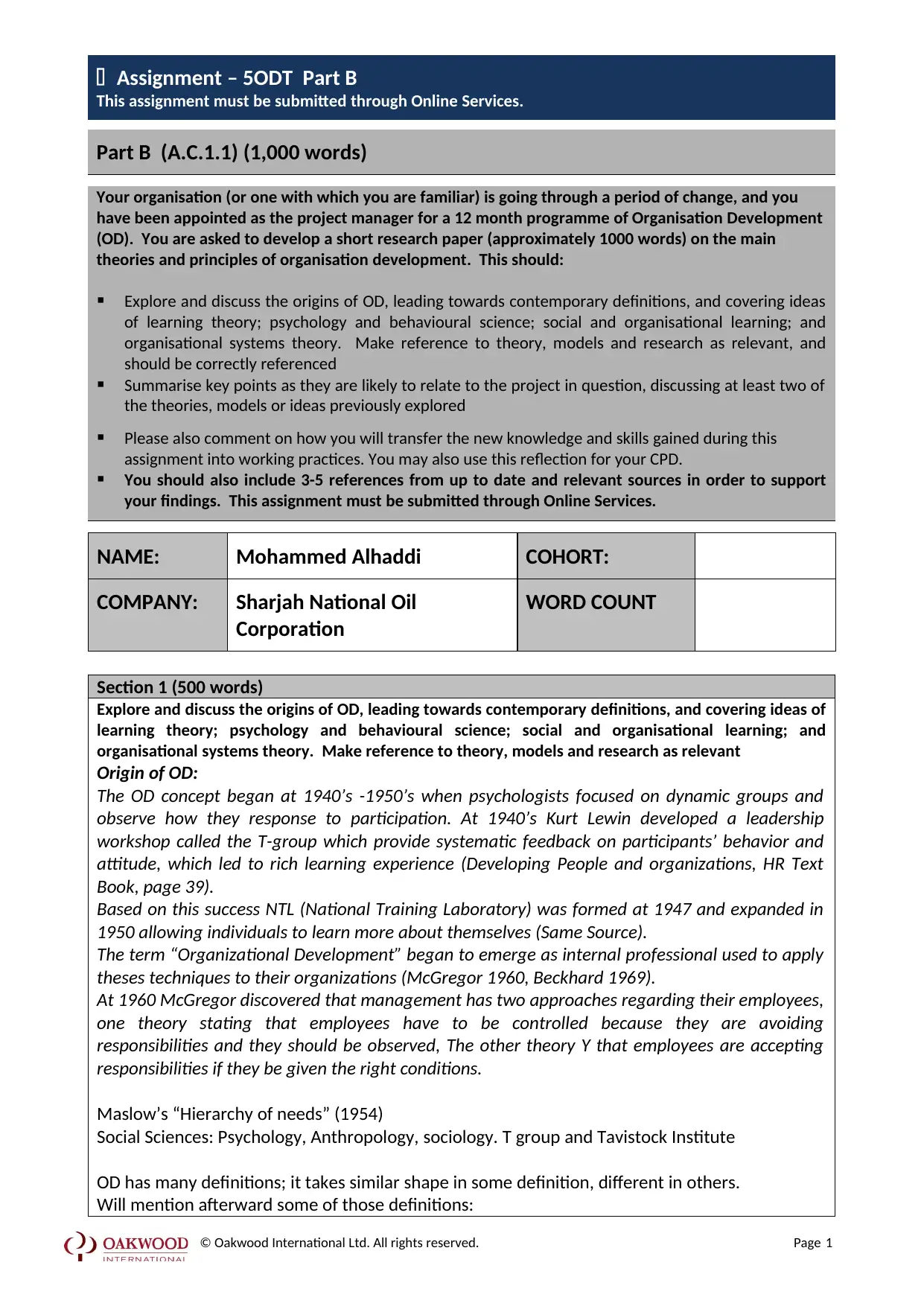
Assignment – 5ODT Part B
This assignment must be submitted through Online Services.
Part B (A.C.1.1) (1,000 words)
Your organisation (or one with which you are familiar) is going through a period of change, and you
have been appointed as the project manager for a 12 month programme of Organisation Development
(OD). You are asked to develop a short research paper (approximately 1000 words) on the main
theories and principles of organisation development. This should:
Explore and discuss the origins of OD, leading towards contemporary definitions, and covering ideas
of learning theory; psychology and behavioural science; social and organisational learning; and
organisational systems theory. Make reference to theory, models and research as relevant, and
should be correctly referenced
Summarise key points as they are likely to relate to the project in question, discussing at least two of
the theories, models or ideas previously explored
Please also comment on how you will transfer the new knowledge and skills gained during this
assignment into working practices. You may also use this reflection for your CPD.
You should also include 3-5 references from up to date and relevant sources in order to support
your findings. This assignment must be submitted through Online Services.
NAME: Mohammed Alhaddi COHORT:
COMPANY: Sharjah National Oil
Corporation
WORD COUNT
Section 1 (500 words)
Explore and discuss the origins of OD, leading towards contemporary definitions, and covering ideas of
learning theory; psychology and behavioural science; social and organisational learning; and
organisational systems theory. Make reference to theory, models and research as relevant
Origin of OD:
The OD concept began at 1940’s -1950’s when psychologists focused on dynamic groups and
observe how they response to participation. At 1940’s Kurt Lewin developed a leadership
workshop called the T-group which provide systematic feedback on participants’ behavior and
attitude, which led to rich learning experience (Developing People and organizations, HR Text
Book, page 39).
Based on this success NTL (National Training Laboratory) was formed at 1947 and expanded in
1950 allowing individuals to learn more about themselves (Same Source).
The term “Organizational Development” began to emerge as internal professional used to apply
theses techniques to their organizations (McGregor 1960, Beckhard 1969).
At 1960 McGregor discovered that management has two approaches regarding their employees,
one theory stating that employees have to be controlled because they are avoiding
responsibilities and they should be observed, The other theory Y that employees are accepting
responsibilities if they be given the right conditions.
Maslow’s “Hierarchy of needs” (1954)
Social Sciences: Psychology, Anthropology, sociology. T group and Tavistock Institute
OD has many definitions; it takes similar shape in some definition, different in others.
Will mention afterward some of those definitions:
© Oakwood International Ltd. All rights reserved. Page 1
This assignment must be submitted through Online Services.
Part B (A.C.1.1) (1,000 words)
Your organisation (or one with which you are familiar) is going through a period of change, and you
have been appointed as the project manager for a 12 month programme of Organisation Development
(OD). You are asked to develop a short research paper (approximately 1000 words) on the main
theories and principles of organisation development. This should:
Explore and discuss the origins of OD, leading towards contemporary definitions, and covering ideas
of learning theory; psychology and behavioural science; social and organisational learning; and
organisational systems theory. Make reference to theory, models and research as relevant, and
should be correctly referenced
Summarise key points as they are likely to relate to the project in question, discussing at least two of
the theories, models or ideas previously explored
Please also comment on how you will transfer the new knowledge and skills gained during this
assignment into working practices. You may also use this reflection for your CPD.
You should also include 3-5 references from up to date and relevant sources in order to support
your findings. This assignment must be submitted through Online Services.
NAME: Mohammed Alhaddi COHORT:
COMPANY: Sharjah National Oil
Corporation
WORD COUNT
Section 1 (500 words)
Explore and discuss the origins of OD, leading towards contemporary definitions, and covering ideas of
learning theory; psychology and behavioural science; social and organisational learning; and
organisational systems theory. Make reference to theory, models and research as relevant
Origin of OD:
The OD concept began at 1940’s -1950’s when psychologists focused on dynamic groups and
observe how they response to participation. At 1940’s Kurt Lewin developed a leadership
workshop called the T-group which provide systematic feedback on participants’ behavior and
attitude, which led to rich learning experience (Developing People and organizations, HR Text
Book, page 39).
Based on this success NTL (National Training Laboratory) was formed at 1947 and expanded in
1950 allowing individuals to learn more about themselves (Same Source).
The term “Organizational Development” began to emerge as internal professional used to apply
theses techniques to their organizations (McGregor 1960, Beckhard 1969).
At 1960 McGregor discovered that management has two approaches regarding their employees,
one theory stating that employees have to be controlled because they are avoiding
responsibilities and they should be observed, The other theory Y that employees are accepting
responsibilities if they be given the right conditions.
Maslow’s “Hierarchy of needs” (1954)
Social Sciences: Psychology, Anthropology, sociology. T group and Tavistock Institute
OD has many definitions; it takes similar shape in some definition, different in others.
Will mention afterward some of those definitions:
© Oakwood International Ltd. All rights reserved. Page 1
Paraphrase This Document
Need a fresh take? Get an instant paraphrase of this document with our AI Paraphraser
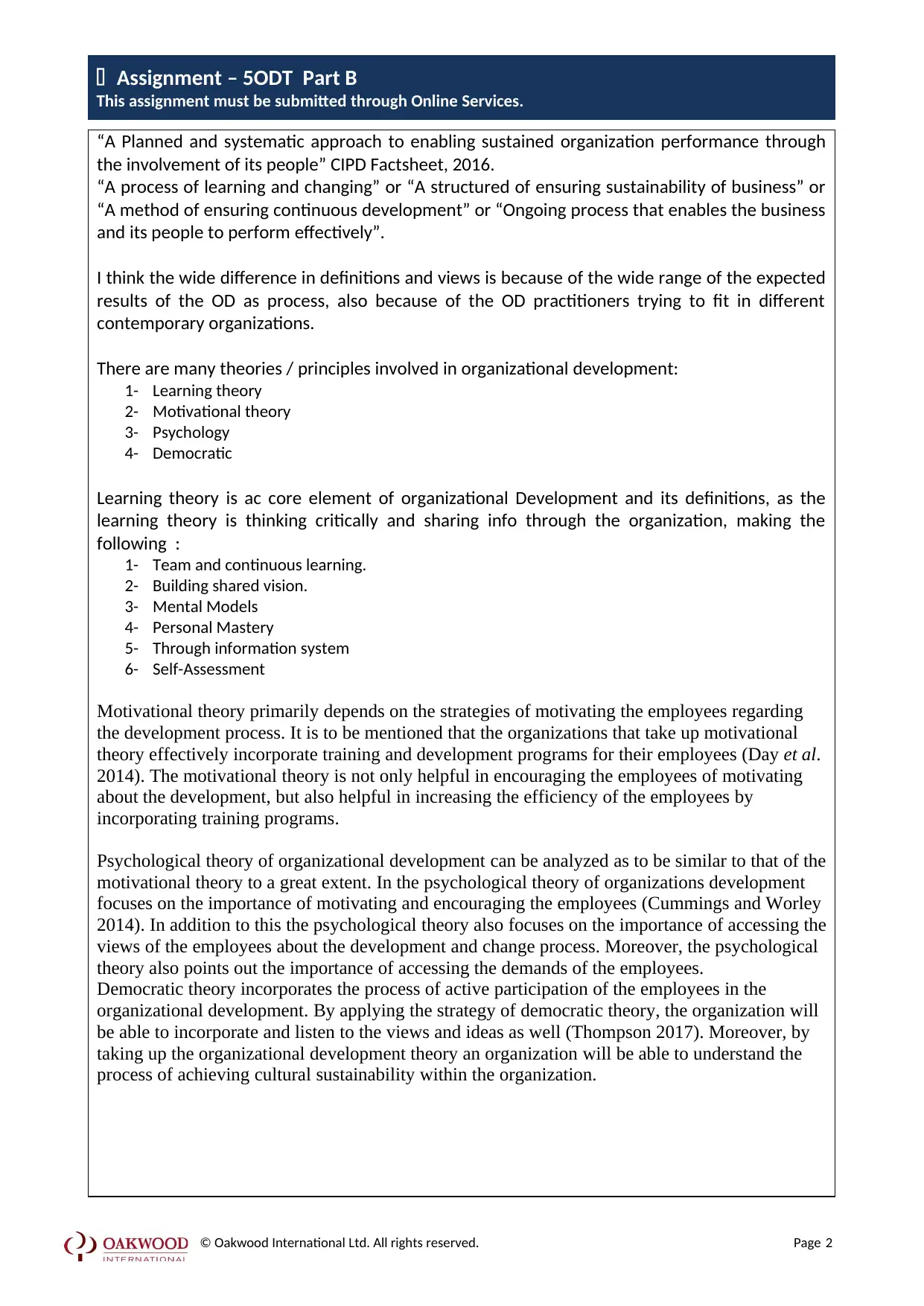
Assignment – 5ODT Part B
This assignment must be submitted through Online Services.
“A Planned and systematic approach to enabling sustained organization performance through
the involvement of its people” CIPD Factsheet, 2016.
“A process of learning and changing” or “A structured of ensuring sustainability of business” or
“A method of ensuring continuous development” or “Ongoing process that enables the business
and its people to perform effectively”.
I think the wide difference in definitions and views is because of the wide range of the expected
results of the OD as process, also because of the OD practitioners trying to fit in different
contemporary organizations.
There are many theories / principles involved in organizational development:
1- Learning theory
2- Motivational theory
3- Psychology
4- Democratic
Learning theory is ac core element of organizational Development and its definitions, as the
learning theory is thinking critically and sharing info through the organization, making the
following :
1- Team and continuous learning.
2- Building shared vision.
3- Mental Models
4- Personal Mastery
5- Through information system
6- Self-Assessment
Motivational theory primarily depends on the strategies of motivating the employees regarding
the development process. It is to be mentioned that the organizations that take up motivational
theory effectively incorporate training and development programs for their employees (Day et al.
2014). The motivational theory is not only helpful in encouraging the employees of motivating
about the development, but also helpful in increasing the efficiency of the employees by
incorporating training programs.
Psychological theory of organizational development can be analyzed as to be similar to that of the
motivational theory to a great extent. In the psychological theory of organizations development
focuses on the importance of motivating and encouraging the employees (Cummings and Worley
2014). In addition to this the psychological theory also focuses on the importance of accessing the
views of the employees about the development and change process. Moreover, the psychological
theory also points out the importance of accessing the demands of the employees.
Democratic theory incorporates the process of active participation of the employees in the
organizational development. By applying the strategy of democratic theory, the organization will
be able to incorporate and listen to the views and ideas as well (Thompson 2017). Moreover, by
taking up the organizational development theory an organization will be able to understand the
process of achieving cultural sustainability within the organization.
© Oakwood International Ltd. All rights reserved. Page 2
This assignment must be submitted through Online Services.
“A Planned and systematic approach to enabling sustained organization performance through
the involvement of its people” CIPD Factsheet, 2016.
“A process of learning and changing” or “A structured of ensuring sustainability of business” or
“A method of ensuring continuous development” or “Ongoing process that enables the business
and its people to perform effectively”.
I think the wide difference in definitions and views is because of the wide range of the expected
results of the OD as process, also because of the OD practitioners trying to fit in different
contemporary organizations.
There are many theories / principles involved in organizational development:
1- Learning theory
2- Motivational theory
3- Psychology
4- Democratic
Learning theory is ac core element of organizational Development and its definitions, as the
learning theory is thinking critically and sharing info through the organization, making the
following :
1- Team and continuous learning.
2- Building shared vision.
3- Mental Models
4- Personal Mastery
5- Through information system
6- Self-Assessment
Motivational theory primarily depends on the strategies of motivating the employees regarding
the development process. It is to be mentioned that the organizations that take up motivational
theory effectively incorporate training and development programs for their employees (Day et al.
2014). The motivational theory is not only helpful in encouraging the employees of motivating
about the development, but also helpful in increasing the efficiency of the employees by
incorporating training programs.
Psychological theory of organizational development can be analyzed as to be similar to that of the
motivational theory to a great extent. In the psychological theory of organizations development
focuses on the importance of motivating and encouraging the employees (Cummings and Worley
2014). In addition to this the psychological theory also focuses on the importance of accessing the
views of the employees about the development and change process. Moreover, the psychological
theory also points out the importance of accessing the demands of the employees.
Democratic theory incorporates the process of active participation of the employees in the
organizational development. By applying the strategy of democratic theory, the organization will
be able to incorporate and listen to the views and ideas as well (Thompson 2017). Moreover, by
taking up the organizational development theory an organization will be able to understand the
process of achieving cultural sustainability within the organization.
© Oakwood International Ltd. All rights reserved. Page 2
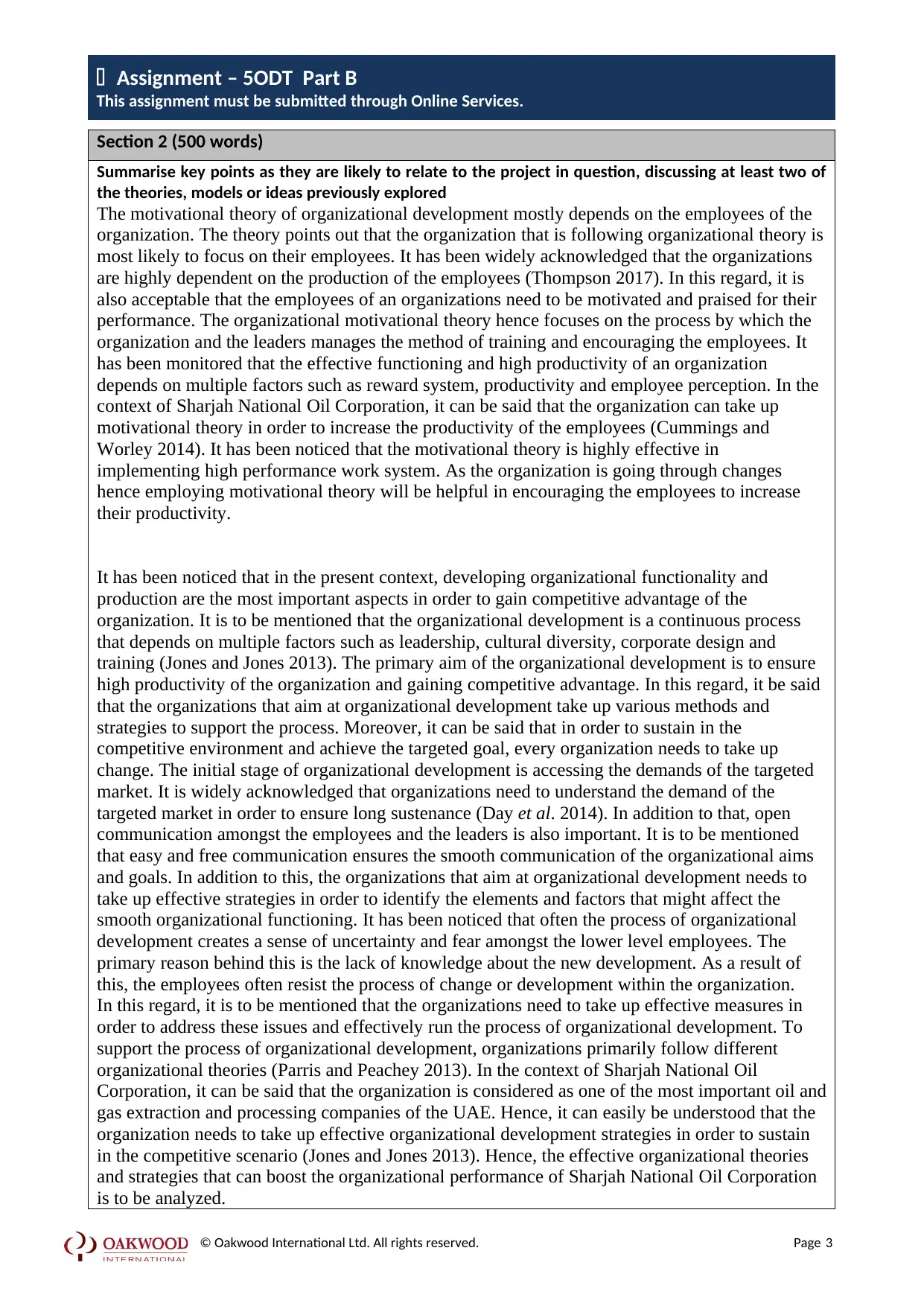
Assignment – 5ODT Part B
This assignment must be submitted through Online Services.
Section 2 (500 words)
Summarise key points as they are likely to relate to the project in question, discussing at least two of
the theories, models or ideas previously explored
The motivational theory of organizational development mostly depends on the employees of the
organization. The theory points out that the organization that is following organizational theory is
most likely to focus on their employees. It has been widely acknowledged that the organizations
are highly dependent on the production of the employees (Thompson 2017). In this regard, it is
also acceptable that the employees of an organizations need to be motivated and praised for their
performance. The organizational motivational theory hence focuses on the process by which the
organization and the leaders manages the method of training and encouraging the employees. It
has been monitored that the effective functioning and high productivity of an organization
depends on multiple factors such as reward system, productivity and employee perception. In the
context of Sharjah National Oil Corporation, it can be said that the organization can take up
motivational theory in order to increase the productivity of the employees (Cummings and
Worley 2014). It has been noticed that the motivational theory is highly effective in
implementing high performance work system. As the organization is going through changes
hence employing motivational theory will be helpful in encouraging the employees to increase
their productivity.
It has been noticed that in the present context, developing organizational functionality and
production are the most important aspects in order to gain competitive advantage of the
organization. It is to be mentioned that the organizational development is a continuous process
that depends on multiple factors such as leadership, cultural diversity, corporate design and
training (Jones and Jones 2013). The primary aim of the organizational development is to ensure
high productivity of the organization and gaining competitive advantage. In this regard, it be said
that the organizations that aim at organizational development take up various methods and
strategies to support the process. Moreover, it can be said that in order to sustain in the
competitive environment and achieve the targeted goal, every organization needs to take up
change. The initial stage of organizational development is accessing the demands of the targeted
market. It is widely acknowledged that organizations need to understand the demand of the
targeted market in order to ensure long sustenance (Day et al. 2014). In addition to that, open
communication amongst the employees and the leaders is also important. It is to be mentioned
that easy and free communication ensures the smooth communication of the organizational aims
and goals. In addition to this, the organizations that aim at organizational development needs to
take up effective strategies in order to identify the elements and factors that might affect the
smooth organizational functioning. It has been noticed that often the process of organizational
development creates a sense of uncertainty and fear amongst the lower level employees. The
primary reason behind this is the lack of knowledge about the new development. As a result of
this, the employees often resist the process of change or development within the organization.
In this regard, it is to be mentioned that the organizations need to take up effective measures in
order to address these issues and effectively run the process of organizational development. To
support the process of organizational development, organizations primarily follow different
organizational theories (Parris and Peachey 2013). In the context of Sharjah National Oil
Corporation, it can be said that the organization is considered as one of the most important oil and
gas extraction and processing companies of the UAE. Hence, it can easily be understood that the
organization needs to take up effective organizational development strategies in order to sustain
in the competitive scenario (Jones and Jones 2013). Hence, the effective organizational theories
and strategies that can boost the organizational performance of Sharjah National Oil Corporation
is to be analyzed.
© Oakwood International Ltd. All rights reserved. Page 3
This assignment must be submitted through Online Services.
Section 2 (500 words)
Summarise key points as they are likely to relate to the project in question, discussing at least two of
the theories, models or ideas previously explored
The motivational theory of organizational development mostly depends on the employees of the
organization. The theory points out that the organization that is following organizational theory is
most likely to focus on their employees. It has been widely acknowledged that the organizations
are highly dependent on the production of the employees (Thompson 2017). In this regard, it is
also acceptable that the employees of an organizations need to be motivated and praised for their
performance. The organizational motivational theory hence focuses on the process by which the
organization and the leaders manages the method of training and encouraging the employees. It
has been monitored that the effective functioning and high productivity of an organization
depends on multiple factors such as reward system, productivity and employee perception. In the
context of Sharjah National Oil Corporation, it can be said that the organization can take up
motivational theory in order to increase the productivity of the employees (Cummings and
Worley 2014). It has been noticed that the motivational theory is highly effective in
implementing high performance work system. As the organization is going through changes
hence employing motivational theory will be helpful in encouraging the employees to increase
their productivity.
It has been noticed that in the present context, developing organizational functionality and
production are the most important aspects in order to gain competitive advantage of the
organization. It is to be mentioned that the organizational development is a continuous process
that depends on multiple factors such as leadership, cultural diversity, corporate design and
training (Jones and Jones 2013). The primary aim of the organizational development is to ensure
high productivity of the organization and gaining competitive advantage. In this regard, it be said
that the organizations that aim at organizational development take up various methods and
strategies to support the process. Moreover, it can be said that in order to sustain in the
competitive environment and achieve the targeted goal, every organization needs to take up
change. The initial stage of organizational development is accessing the demands of the targeted
market. It is widely acknowledged that organizations need to understand the demand of the
targeted market in order to ensure long sustenance (Day et al. 2014). In addition to that, open
communication amongst the employees and the leaders is also important. It is to be mentioned
that easy and free communication ensures the smooth communication of the organizational aims
and goals. In addition to this, the organizations that aim at organizational development needs to
take up effective strategies in order to identify the elements and factors that might affect the
smooth organizational functioning. It has been noticed that often the process of organizational
development creates a sense of uncertainty and fear amongst the lower level employees. The
primary reason behind this is the lack of knowledge about the new development. As a result of
this, the employees often resist the process of change or development within the organization.
In this regard, it is to be mentioned that the organizations need to take up effective measures in
order to address these issues and effectively run the process of organizational development. To
support the process of organizational development, organizations primarily follow different
organizational theories (Parris and Peachey 2013). In the context of Sharjah National Oil
Corporation, it can be said that the organization is considered as one of the most important oil and
gas extraction and processing companies of the UAE. Hence, it can easily be understood that the
organization needs to take up effective organizational development strategies in order to sustain
in the competitive scenario (Jones and Jones 2013). Hence, the effective organizational theories
and strategies that can boost the organizational performance of Sharjah National Oil Corporation
is to be analyzed.
© Oakwood International Ltd. All rights reserved. Page 3
⊘ This is a preview!⊘
Do you want full access?
Subscribe today to unlock all pages.

Trusted by 1+ million students worldwide
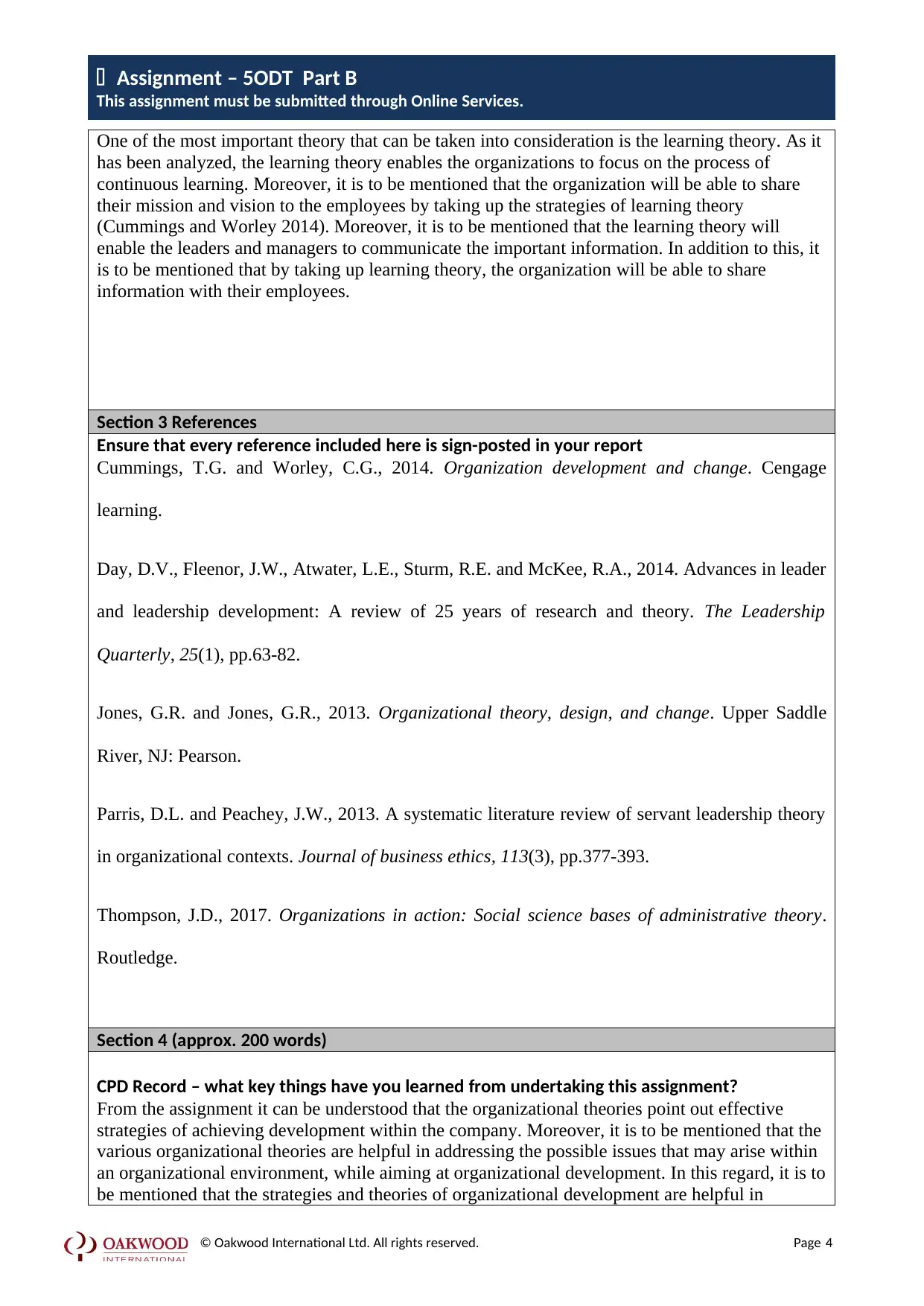
Assignment – 5ODT Part B
This assignment must be submitted through Online Services.
One of the most important theory that can be taken into consideration is the learning theory. As it
has been analyzed, the learning theory enables the organizations to focus on the process of
continuous learning. Moreover, it is to be mentioned that the organization will be able to share
their mission and vision to the employees by taking up the strategies of learning theory
(Cummings and Worley 2014). Moreover, it is to be mentioned that the learning theory will
enable the leaders and managers to communicate the important information. In addition to this, it
is to be mentioned that by taking up learning theory, the organization will be able to share
information with their employees.
Section 3 References
Ensure that every reference included here is sign-posted in your report
Cummings, T.G. and Worley, C.G., 2014. Organization development and change. Cengage
learning.
Day, D.V., Fleenor, J.W., Atwater, L.E., Sturm, R.E. and McKee, R.A., 2014. Advances in leader
and leadership development: A review of 25 years of research and theory. The Leadership
Quarterly, 25(1), pp.63-82.
Jones, G.R. and Jones, G.R., 2013. Organizational theory, design, and change. Upper Saddle
River, NJ: Pearson.
Parris, D.L. and Peachey, J.W., 2013. A systematic literature review of servant leadership theory
in organizational contexts. Journal of business ethics, 113(3), pp.377-393.
Thompson, J.D., 2017. Organizations in action: Social science bases of administrative theory.
Routledge.
Section 4 (approx. 200 words)
CPD Record – what key things have you learned from undertaking this assignment?
From the assignment it can be understood that the organizational theories point out effective
strategies of achieving development within the company. Moreover, it is to be mentioned that the
various organizational theories are helpful in addressing the possible issues that may arise within
an organizational environment, while aiming at organizational development. In this regard, it is to
be mentioned that the strategies and theories of organizational development are helpful in
© Oakwood International Ltd. All rights reserved. Page 4
This assignment must be submitted through Online Services.
One of the most important theory that can be taken into consideration is the learning theory. As it
has been analyzed, the learning theory enables the organizations to focus on the process of
continuous learning. Moreover, it is to be mentioned that the organization will be able to share
their mission and vision to the employees by taking up the strategies of learning theory
(Cummings and Worley 2014). Moreover, it is to be mentioned that the learning theory will
enable the leaders and managers to communicate the important information. In addition to this, it
is to be mentioned that by taking up learning theory, the organization will be able to share
information with their employees.
Section 3 References
Ensure that every reference included here is sign-posted in your report
Cummings, T.G. and Worley, C.G., 2014. Organization development and change. Cengage
learning.
Day, D.V., Fleenor, J.W., Atwater, L.E., Sturm, R.E. and McKee, R.A., 2014. Advances in leader
and leadership development: A review of 25 years of research and theory. The Leadership
Quarterly, 25(1), pp.63-82.
Jones, G.R. and Jones, G.R., 2013. Organizational theory, design, and change. Upper Saddle
River, NJ: Pearson.
Parris, D.L. and Peachey, J.W., 2013. A systematic literature review of servant leadership theory
in organizational contexts. Journal of business ethics, 113(3), pp.377-393.
Thompson, J.D., 2017. Organizations in action: Social science bases of administrative theory.
Routledge.
Section 4 (approx. 200 words)
CPD Record – what key things have you learned from undertaking this assignment?
From the assignment it can be understood that the organizational theories point out effective
strategies of achieving development within the company. Moreover, it is to be mentioned that the
various organizational theories are helpful in addressing the possible issues that may arise within
an organizational environment, while aiming at organizational development. In this regard, it is to
be mentioned that the strategies and theories of organizational development are helpful in
© Oakwood International Ltd. All rights reserved. Page 4
Paraphrase This Document
Need a fresh take? Get an instant paraphrase of this document with our AI Paraphraser
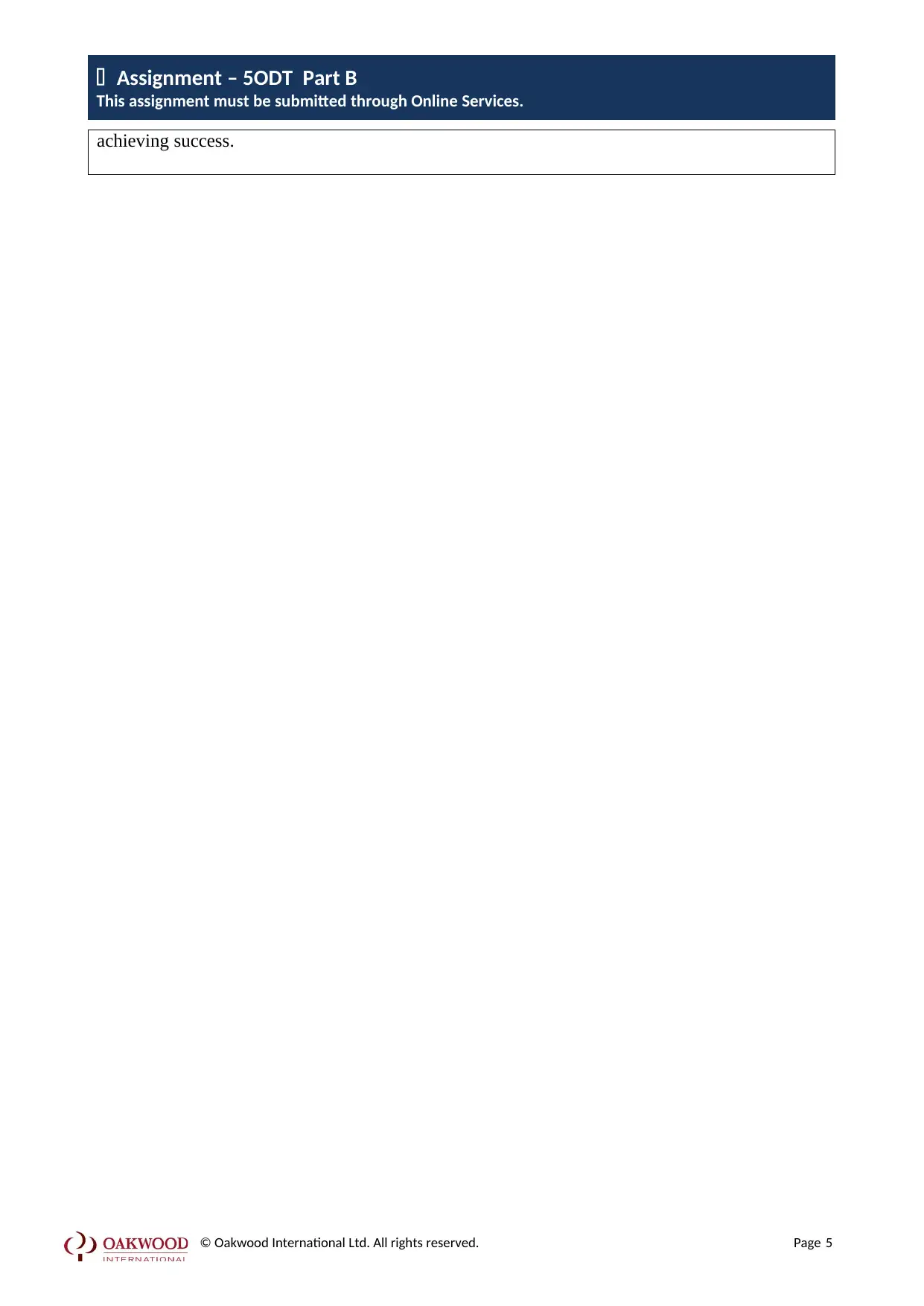
Assignment – 5ODT Part B
This assignment must be submitted through Online Services.
achieving success.
© Oakwood International Ltd. All rights reserved. Page 5
This assignment must be submitted through Online Services.
achieving success.
© Oakwood International Ltd. All rights reserved. Page 5
1 out of 5
Related Documents
Your All-in-One AI-Powered Toolkit for Academic Success.
+13062052269
info@desklib.com
Available 24*7 on WhatsApp / Email
![[object Object]](/_next/static/media/star-bottom.7253800d.svg)
Unlock your academic potential
Copyright © 2020–2026 A2Z Services. All Rights Reserved. Developed and managed by ZUCOL.





